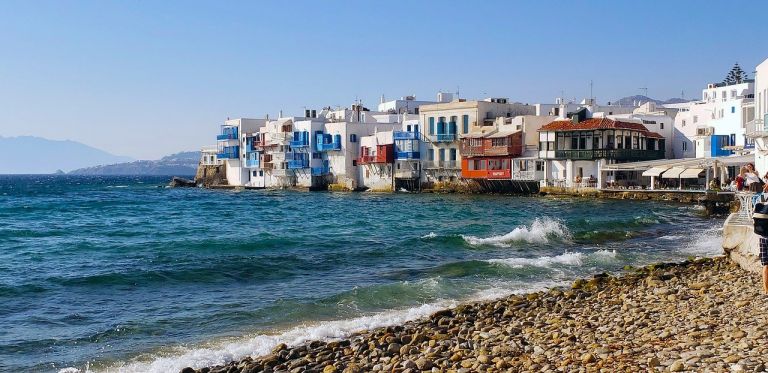Greek bulk shipping and its related activities are an eminently extrovert sector. The Bank of Greece recognises the importance of Greek bulk shipping for the Greek economy and, therefore, attaches particular importance to the collection of reliable data in the maritime shipping sector. The development of a model for the estimation of Greek shipping activity is indicative.
The imposition of restrictions on capital movement in 2015 resulted in a significant decrease in incoming remittances from the second half of 2015, based on external transactions data of the domestic banking system. However, there were no indications of a corresponding decrease in the real economic activity of the sector and, thus, in its contribution to the Greek economy. In order to address and remedy this inconsistency, the Bank of Greece developed a model for the assessment of Greek maritime shipping activity. Since the reference month of September 2018, data from both international databases and maritime-related administrative sources have been used retroactively for the compilation of the maritime balance of payments accounts since January 2015. The objective of this model is to provide a coherent statistical framework for the estimation of balance of payments data related to maritime activity.
Based on the data of the Bank of Greece model, during the fourth quarter of 2021 more than 3,000 ships of about 202 million tons (dwt) total capacity were managed by Greece, having recorded a significant increase since 2015. The average weighted age of these ships is less than 11 years. Maritime shipping receipts were and are necessary to cover a large part of the country’s external financing needs. According to data from the Bank of Greece, the receipts from maritime transport services in the period
2015–2021 exceeded –on average– €13 billion per year (i.e. approximately 7.5% of GDP), representing 41% of the total receipts of the balance of services. In the same period net receipts (receipts less payments) were – on average – over EUR 6 billion per year and covered 30% of the balance of goods deficit.
The upward trend in revenues from maritime transport in 2017–2019 was halted in 2020 due to the COVID-19 pandemic. However, receipts from maritime transport rose significantly in 2021 to €17.2 billion.
This development reflects the increase in both freight prices and the active merchant fleet operated in Greece. According to the first indications, the first two months of 2022 saw an increase in revenues from maritime transport.
During the crisis, it was important to support the maritime shipping community in the Greek economy through voluntary contributions. The relevant co-relationship between the Greek State and the shipping community, following two annual extensions, lasted for five years (2014–2018). After its expiry, a new joint agreement was concluded in February 2019, which provides for the indefinite voluntary payment by the shipping community of 10% of the dividends imported into Greece. The amount paid shall be at least €40 million per year.
Greek-owned shipping and the wider maritime cluster can play a decisive role in the recovery of the Greek economy, contributing to GDP growth both directly and indirectly. According to an earlier IOBE study (Foundation for Economic and Industrial Research, 2013), the domestic added value (direct and indirect) of the maritime transport sector amounted to €13.3 billion in 2009, while providing employment for more than 192,000 people. Furthermore, operators of shipping companies can play an important role in filling the investment gap of the Greek economy via their investments in the Greek economy, in sectors related to maritime shipping (such as shipyards) or others.
All things considered, the attraction of more ships for commercial management in Greece, as well as the expansion and widening of the maritime cluster services provided, including those of shipyards, could increase the contribution of maritime shipping to the Gross Domestic Product and enhance the extroversion of the Greek economy. For a country the size of Greece it is a unique achievement to be a world leader in the shipping sector. According to UN data (UNCTAD, 2021), Greece remains at the top of international shipping in terms of tonnage (dwt), although only 17.5% of the Greek-owned and/or managed fleet is flying the Greek flag.
Greek maritime shipping has traditionally been a dominant force in the Greek economy, effectively addressing challenges both internationally and nationally, and has learned to successfully address any challenges that have arisen in the past. One of these was the COVID-19 pandemic, which created a number of challenges for global maritime shipping, such as crew changes that required the movement of seafarers at a time when international transport was restricted. The recent Russian invasion of Ukraine also posed further challenges to shipping.
Today, maritime shipping faces a number of challenges:
• Firstly, a slowdown in the world economy, trade protectionism and the de-nationalisation of production: Russia’s invasion of Ukraine and the expected slowdown in the world economy will also negatively affect the demand for transport of goods by sea, while exacerbating the supply chain disruptions caused by the COVID-19 pandemic.
• Secondly, environmental rules: In recent years, the global maritime agenda has been dominated by environmental and green technology issues. In the long term, global shipping is expected to significantly reduce greenhouse gas emissions.
• Thirdly, technological challenges and safety: Vessel equipment and fleet management tools are integrating increasingly innovative technologies. However, there are concerns about the security of these systems and the likelihood of them becoming targets of cyber-attacks. Therefore, it is important to establish an international institutional framework to limit the risks to both vessel and port systems.
• Fourthly, funding from the European banking system: In recent years, especially following the withdrawal of European shipping banks from the country, there has been a decrease in the financing of bulk shipping by the European banking system. This trend is also observed in the rest of Europe, as significant decreases have been recorded in the portfolios of banks that traditionally financed shipping. However, thanks to the international nature of the sector, part of the financing gap was filled by Asian financial institutions closely linked to the shipyards in these countries, as well as by alternative sources of financing. In addition, shipping companies have recently issued bonds on the Athens Stock Exchange.
Mr Yannis Stournaras is the governor of the Bank of Greece.

![ΟΤ Forum – Εξάρχου [AKTOR]: Μεγάλο ενδιαφέρον από ξένους που θέλουν να επενδύσουν στην Ελλάδα](https://www.ot.gr/wp-content/uploads/2025/05/ot_Exarchou.png)








































